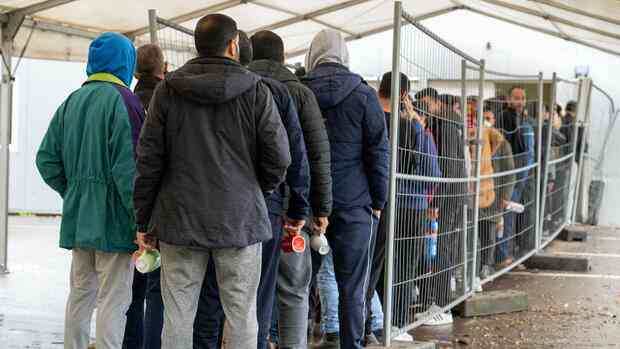Berlin The general manager of the Association of Towns and Municipalities, Gerd Landsberg, has welcomed the call from a group of Green politicians for tougher asylum policies. “We need a change in migration policy, also to ensure acceptance in society,” Landsberg told the Handelsblatt. “This includes a good integration concept, clear communication, also towards the people who arrive, and active participation on the part of the asylum seekers.”
A group within the Greens had previously spoken out in favor of a change of course in refugee policy in view of the completely overburdened municipalities. It is called “Vert Realos”. “Vert” comes from French and means “green”.
The signatories, including Rebecca Harms, the ex-group leader in the European Parliament, and Tübingen’s Mayor Boris Palmer, emphasize that Germany cannot take in all the refugees alone and without European cooperation. “We carry one of the biggest burdens in the EU, but that should also take place in an acceptable relationship with comparable EU member states.”
Landsberg, who is a member of the CDU, stressed that of course one had to help people who were being persecuted or who came from war zones like Ukraine. But that is also a European challenge. “It cannot be that Germany bears the brunt and the other EU countries take in significantly fewer people,” said the head of the association of cities. The principle in Europe must be: help, distribute fairly, but also protect the external borders effectively. “This is also essential for acceptance among our population.”
Criticism of the lack of a “clear integration concept”
The Greens’ advance is also being debated in the traffic light coalition. The FDP was open to the demands, the SPD reacted cautiously. The spokesman for migration and integration of the SPD parliamentary group, Lars Castellucci, spoke of an “internal matter” for the Greens. “They should be happy to discuss it,” Castellucci told Handelsblatt. “If there are concerns in the coalition, they are discussed openly.”
Landsberg emphasized that of course one had to help people who were being persecuted or who were coming from war zones like Ukraine.
(Photo: dpa)
However, Castellucci recalled the agreements in the coalition agreement. Together they agreed on a “restart towards an active, well-regulated and forward-looking migration policy”. Germany is “urgently” dependent on immigration. “So it is important to reduce irregular migration, but to enable regular migration,” emphasized the SPD politician.
Like the signers of the Green Paper, the FDP attaches great importance to a more consistent deportation of criminal and illegal migrants. “In order to ensure that migration remains manageable for Germany, we must reduce irregular migration and carry out returns more effectively,” Stephan Thomae, parliamentary manager of the parliamentary group in the Bundestag, told the Handelsblatt. This must be even better than it has been in the past. “Criminals and threats must not find a loophole, they must leave our country immediately.”
For people’s acceptance, it is also “crucial that we give clear answers as to how refugees and asylum seekers can be housed and cared for, how foreigners with no prospects of staying in Germany can leave and, above all, how we can guarantee internal security,” said Thomae further. And he added: “If there are voices in the Greens who want to discuss these points, we are open to them.”
In its paper, the Green Group criticizes the lack of a “clear integration concept”. “The migrants don’t know what is expected of them and set off on the long journey with false hopes.” There is hardly any difference between war, asylum and economic migrants.
>> Read here: DIW President Fratzscher warns of a change in mood against refugees
One demand is that asylum seekers have to fit into the “historically evolved social order of the Federal Republic of Germany”. The granting of asylum also presupposes that asylum seekers participate in the admission procedure and do not become criminal. “Otherwise, the right to asylum and thus the right of residence will lapse, which must also result in deportation (as soon as possible).”
The federal government wants to pass a new law on the immigration of skilled workers at the beginning of March
The Green politicians are calling for an immigration law for economic migrants. The federal government intends to adopt regulations on this at the beginning of March. A draft bill for the planned new law on the immigration of skilled workers envisages attracting more workers from abroad with easier recognition and a new opportunity map.
In the future, it should be easier to recruit more workers from abroad.
(Photo: dpa)
Interior Minister Nancy Faeser, Labor Minister Hubertus Heil (both SPD), Economics Minister Robert Habeck (Greens) and Education Minister Bettina Stark-Watzinger (FDP) had already presented key points in November after they had been decided in the cabinet.
>> Read also: Where refugees come to Germany from – the most important facts in eleven graphics
One of the signatories to the Green Paper is Jens Marco Scherf, District Administrator in Miltenberg in Lower Franconia. The Green politician’s recent appearance on Markus Lanz’s ZDF talk show caused a stir.
Scherf said migration in his district was largely successful. But if it is to continue to succeed in the future, one must have the courage to “address grievances quite openly, without being defamed, without wanting to denigrate everyone”.
At a meeting in Berlin on Thursday, the federal, state and local governments agreed on better coordination on the accommodation and care of refugees. However, the President of the German District Association, Reinhard Sager, was dissatisfied with the overall results.
More: The EU wants to increase the number of deportations
